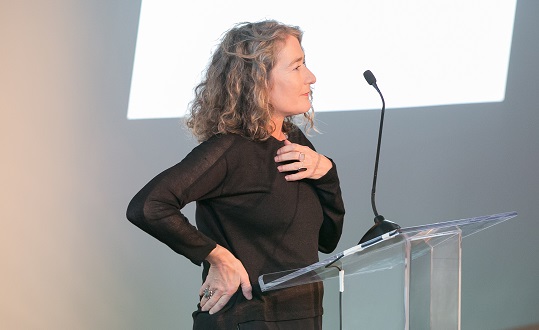This Tuesday evening marked one of the most important nights for international literature in New York (which are few and far between), and what a star-studded, city-lit affair it was. The annual Words Without Borders Gala at the spacious TriBeCa Three Sixty kicked off with a cocktail hour featuring surround views of the Manhattan skyline, reunions of old friends and co-translators, and plenty of champagne-fueled gossip. I was feeling a bit out of place (unpublished, fluent enough in just one foreign language) and wary of the champagne (knowing I might need to form complete sentences in front of Edith Grossman later).
But the atmosphere overall was decidedly celebratory. When I chatted with Words Without Borders’s founding chairperson, the retired newspaper man Jim Ottaway, we noted that perhaps this air of goodwill reflects how literature in translation is motivated more by passion than profit—there was no business to be done, no egos in the room. Translators and the community that supports them are all rooting for a common cause. “I suppose it is a nonprofit,” I said of the organization. “Very nonprofit-y,” Mr. Ottaway agreed, surveying the room.
The gala is known for being a who’s who of writers, translators, and publishing bigwigs. Everyone mingled in the rare, low-pressure environment to celebrate the online magazine that put literature from elsewhere on the United States’ map for the first time, at least in a consistent and visible way. As acclaimed translator Susan Bernofsky put it to me, “Words Without Borders has been the pioneer of this kind of publishing—it sort of gave rise to all these other great journals and now there’s a whole fantastic landscape, which I’m really happy about.”
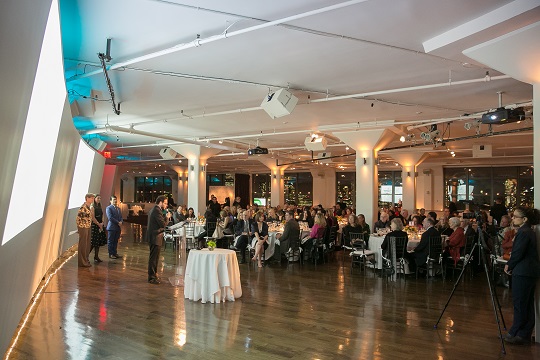
WWB translators reading poetry both in the original language and in English for the guests
Throughout the cocktail portion, groups of guests taking advantage of the unusually formal occasion, by publishing standards, to dress in understated black ensembles and sensible heels posed for photos in front of a red-carpet-style, Words Without Borders backdrop. Calls of “how have you been?” bounced off the floor-to-ceiling windows as familiar faces caught sight of more familiar faces, reinforcing the completely true notion that everyone in publishing—especially of translated literature—knows each other. Refined cheek pecks were quickly followed by earnest probes of “what are you working on now?” in keeping with the crowd. We all wanted to know what we had to look forward to next season or next year. María José Jiménez told WWB Communications Coordinator Savannah Whiting about translating a novel by Uruguayan writer Rafael Courtoisie with Anna Rosenwong. Ms. Bernofsky had just turned in a new Jenny Erpenbeck translation the day before. Natasha Wimmer and agent Cristóbal Pera chattered in Spanish about the Wimmer’s current project—translating El Comensal by Grabriela Ybarra, which is also in development for a film, according to Pera. I felt very excited and also as if I were just assigned a lot of homework—a feeling familiar to any avid reader.
After an hour or so, ushers attempted (mostly fruitlessly) to herd the chatting invitees into the dining room for the main event: the presenting of the Ottaway Award for the Promotion of International Literature (as well as some Chilean Sea Bass—my personal heaven). Edith Grossman, the eminent translator of Garcia Marquez, Cervantes, and many more, opened the remarks with a typically exacting summation of the sentiments I gleaned from many attendees throughout the night: “What is there to say for translators like myself to Words Without Borders other than thank you, thank you very much, for your support of translators and translation, for your protection…for your proselytizing …it is very much appreciated and cherished by those of us who live in the hinterlands of literature where translation takes place.”
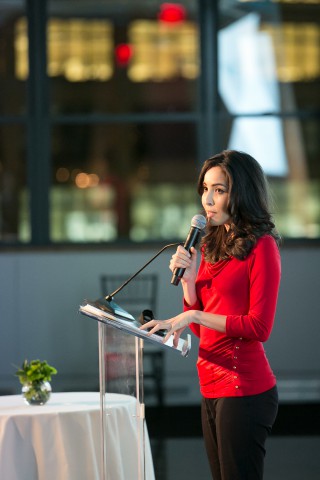
Journalist Roxana Saberi
The journalist Roxana Saberi, famous for her imprisonment in Iran while reporting there, and after last night, I have to assume, for her incredibly shiny hair, acted as our enthusiastic MC. She first asked founding editor of Words Without Borders Samantha Schnee to offer a proper introduction to the organization for those in the audience who weren’t already members of our cult of appreciation—i.e. the actual donors, i.e. not the writers/translators/me. (The writers and translators provided proximity to greatness and scintillating conversation; I was “press.”) Then the inimitable Hilton Als of the New Yorker presented the woman of the hour, New Directions’s Publisher and 2016 Ottaway Award recipient Barbara Epler—the introduction itself could have been a standalone essay in the Paris Review. To quote just the tail end, “She translates writers to themselves. Barbara is an American genius who found her home, New Directions, which is as American an enterprise as they come—independent, true, weird, beautiful in form…she has instincts that cannot be bought… The world of heart and imagination, that’s where she lives, the temple in which Barbara dwells, right here on earth. Congratulations Barbara.”
Ms. Epler accepted the award from Mr. Ottaway himself, who told me later that he’d decided to help WWB set up its nonprofit status after reading two articles—one about the notorious three percent statistic that represents how much literature published in the US is translated from other languages. The other was an assessment “by a committee of 40 moderate, Arab, Muslim scholars…of the state of the civilization and culture of the Arab world, and they found—what they were most critical about—is that only three percent of the books read in the Muslim world are translated from another language.” Mr. Ottaway spoke of being struck that the US was no more accepting of foreign literature than a culture known for its censorship and minimal freedom of expression. Ms. Epler is now the 4th recipient of the award bearing Mr. Ottaway’s name.
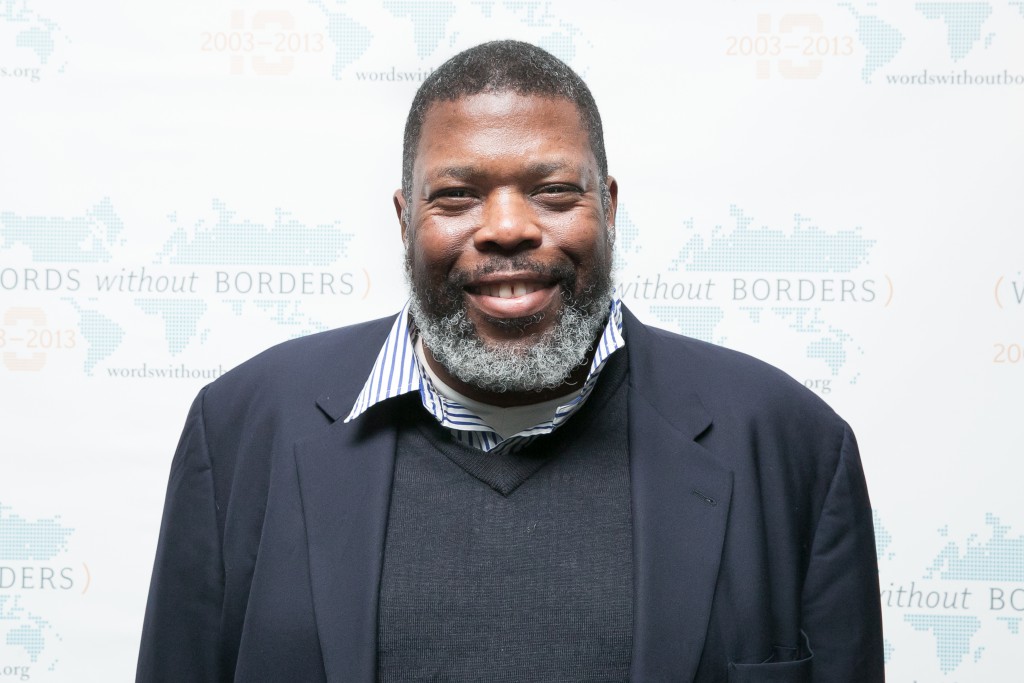
Writer and critic Hilton Als, who presented the Ottaway Award to Barbara Epler
Ms. Epler made a brief speech with the grace and humility for which she is known in the industry, consisting primarily of thank you’s to others who make New Directions’s publishing the incredible producer of books that it is. She concluded with a poignant statement that drew cheers and some significant, vaguely terrified glances: “I thank all of you, and I think a project like Words Without Borders, you know, we’re in a crazy time when people are talking about building walls, and I feel like we’re all talking about tearing them down.”
She was not the only person to allude to the current political climate throughout the night. It was an unusual infiltration of such “mainstream news” into the literary crowd (with its stubborn glorification of dead poets, arcane references, and the habit of having one’s nose too far into a book to notice politicians or pop culture) that highlighted the all-encompassing and urgent nature of this year’s election cycle and the international spotlight that has made even this group of bookworms feel a bit blinded. If we can call the writers and translators in attendance and otherwise, as well as their publishers like Words Without Borders and New Directions, standard bearers of American culture here and abroad, there seemed to be a justified weight of responsibility in the air—a responsibility to counterbalance the current rhetoric and reality that have overwhelmed the American collective consciousness this year. Even standing at a podium seemed to bring the recent debates to mind. When Ms. Grossman first got up to speak, the lights shined into her eyes, and she blocked the glare: “I’m sorry I feel like a neo-fascist with my hand up…could we move …That’s much better, now I don’t feel like a stand-in for Trump.”
It felt good to be in a room full of people dedicating their time and/or money, and in many cases their life’s work, to bringing out new voices, new perspectives, and most importantly, as Ms. Schnee noted, empathy. Novelist and translator Idra Novey told me she “can’t quite remember what American writing was like before Words Without Borders—it was a dark and domestic place…they like made the airport and then everything else took off.” She’s right, and we can only hope that things will continue to take off. When I asked writer Siri Hustvedt why she’d made the time to be there and host a table, she responded emphatically, “Because, I can tell you this, one of the great shames of American publishing is how few books in translation are published here and because of that, my feeling is this: that this is not about doing other cultures favors. This is about being deprived…we’re depriving ourselves by not publishing literature in translation.” I told her I do agree, and then, having spoken to Siri effing Hustvedt, I felt fulfilled for the evening and decided I should no longer deprive myself of wine.
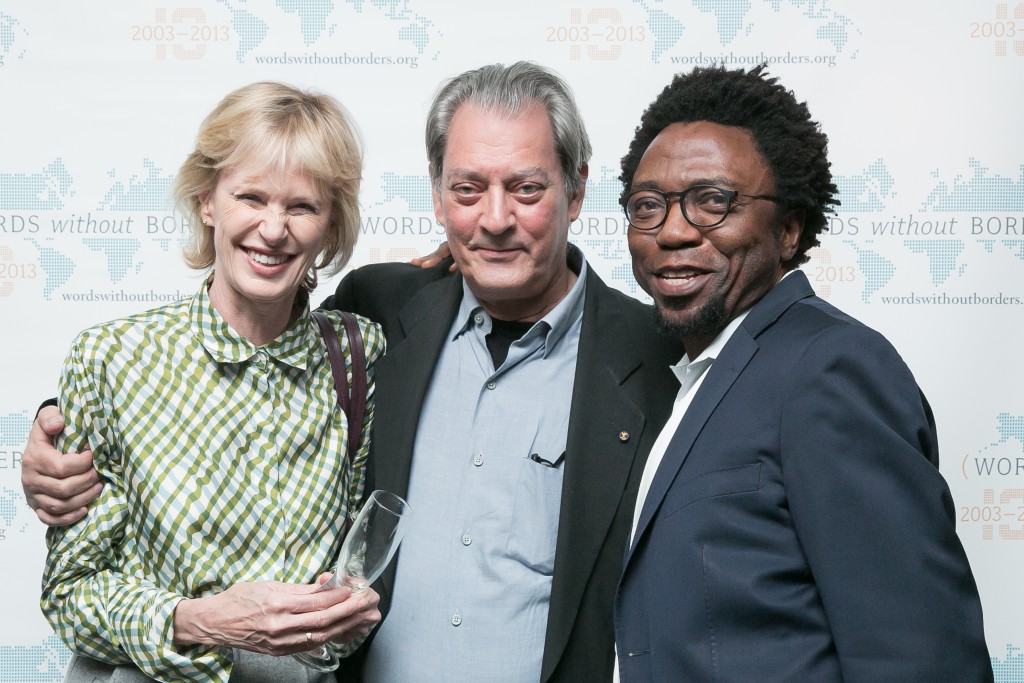
Writers Siri Hustvedt, Paul Auster, and Patrice Nganang
It was time for the after party, after all! The Globe Trot goes down, one might say, in a neighboring room after the dinner and is organized by WWB’s Young Publishers Committee, comprised of young and fabulous editors such as chair Corinna Barsan of Grove Atlantic and Kendall Storey of Archipelago Books. Tickets to the Globe Trot are more within reach of those of us who are, well, young and in publishing. So the future who’s who come in and the more eminent guests tend to make their way home for the evening—if anything, I imagine, to avoid eager fans and anxious networkers. Musician Martín Perna kicked it off (I missed him because I was stalking Siri, but I’m sure his vinyl set was really cool) and then DJ Herbert Holler of Freedom Party® NYC took over and we all had incredible desserts and more wine.
I took a deep breath and started to come down from all of the heady emotions of the gala and my nervousness about speaking to important strangers. I looked around and thought to myself, I love the hinterlands of literature. A ghostly vision of Edith Grossman winked at me in mind’s eye. And then all of us bookworms sort of moved around to salsa music like we were drunk on a Tuesday, which we were.
Photos courtesy of Beowulf Sheehan
Madeline Jones is an editorial assistant at Henry Holt & Company and a blog editor at Asymptote. She lives in Brooklyn and eats mac and cheese anywhere.
***
Read More Dispatches:

